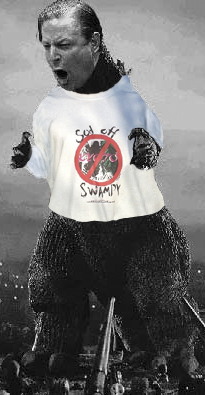Tin Pots, Hot Spots, Tempests and Despots
You’re right. Africa.
I’ve been doing an admirable job, blonde-wise, of keeping up with the goings, comings and hand wringings about Sudan, Zimbabwe, Rwanda, Chad…the misery list seems interminable doesn’t it? Major Dad’s photos from Somalia sit framed on our sofa table (they were one of the first Marine Corps heavy helo outfits in) and he talks sometimes about what a jolt Mogadishu had been. Even to jarheads who’d prowled the depths of Olongapo and thought they knew what third world was. This time though, I find myself nodding ‘ah so’ or giving Major Dad a smidge more background to the story they just had on the screen because of a book I picked up last year. I’d like to recommend it, if you haven’t read it and have an interest in such things. It’s called Dark Star Safari: overland from Cairo to Capetown, by Paul Theroux (2003). It’s a travelogue. Forty years before he’d been both a teacher in Uganda and Peace Corps worker in Malawi. On the eve of his 60th birthday he determined to go ‘walk-about’ in the Africa of his 20’s. See if it was still there, if any of his friends were, if any of those dusty days spent teaching had sown seeds.
He touches on almost every subject we see on the newscasts; observes, records, talks to locals. Spares no one’s ignorance, including those at home. One of my favorite passages in the book happens as he’s meeting an old friend, who has become the Ugandan Prime Minister.
I called him back and he said I should come to his office the next day. He said it was a waste of time to give me directions.
“The prime minister’s office! Everyone knows where the prime minister’s office is. Ask any taxi driver!”
The same bluster-he hadn’t changed. From the beginning, when he joined my department as a lecturer in 1966, I had found him interesting. He had just come from Chicago, where he earned a Ph.D. in political science. On first meeting him, I asked him how he liked Chicago. He said,”Immensely.” Some months later he said he had had several run-ins with the Chicago police, what is now known as racial profiling.
“Each time it was the same. I would be walking home late at night after studying at the library. A police car would pull up to the curb and a white policeman would say, ‘Get over here, nigger. Where are you going?'”
“What did you do?” I asked.
“I said, ‘Officer, I am not a nigger. Do not call me a nigger. I am Ugandan, an African. I am a student here and I am doing nothing wrong.'” And then his voice became shrill:”‘I am not a nigger!'”
Saying he was an African usually worked. One policeman even apologized, saying,””Sorry, we didn’t know you were an African. We thought you were a nigger.”
He paints such pictures that you can almost smell the market, loathe the aid workers in their white Range Rovers, feel the natural pride in so many of the people trying to hold back the tide. Or pick up the pieces after it’s already washed through. A chapter called ‘Invading Drummond’s Farm‘ deals with Zimbabwe and Mugabe’s destruction of it:
Even the kindly winner of the Nobel Peace Prize, the Reverend Desmond Tutu, had said, “The man is bonkers.”
and:
Later on, near the lake, I chatted with an African who owned a fishing cooperative. He was Joseph, a Malawian, who said the farm invasions were a “disaster.” I asked him what he thought of his homeland, Malawi. “Hopeless,” he said. He added that he seldom went home, because it so happened that he was successful in his fishing business.
“If I go back to Malawi my relatives will borrow money and eat my food and make me poor.”
Joseph explained that protecting what you had achieved was a serious problem in this part of Africa. He was not speaking of the white farmers whose land had been invaded, but he could have been. If someone had money or land or food, onlookers were attracted, feeling they were entitled, and everyone tried to take something.
I’m not suggesting it will change your mind, make a case for intervention…or not, blahblahblah, so no squawking ‘agendista’. I just think most of you’d like it.

Sounds fascinating. Thanks for the recommendation!
“Joseph explained that protecting what you had achieved was a serious problem in this part of Africa. He was not speaking of the white farmers whose land had been invaded, but he could have been. If someone had money or land or food, onlookers were attracted, feeling they were entitled, and everyone tried to take something.”
Sounds like the stories I’ve heard from successful Mainland-born Taiwanese businessmen going back home to China.
Entirely my pleasure, Curtis!
John ~ I don’t doubt it. One of the weirdest ironies in that particular chapter is the absolute outrage of the ‘vet’ in possession of a chunk of purloined property, when more ‘vets’ arrive and try to claim the piece of land that’s already stolen.